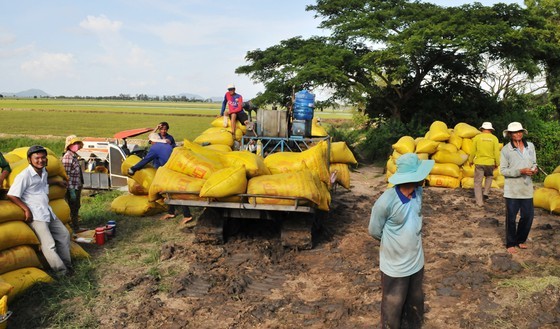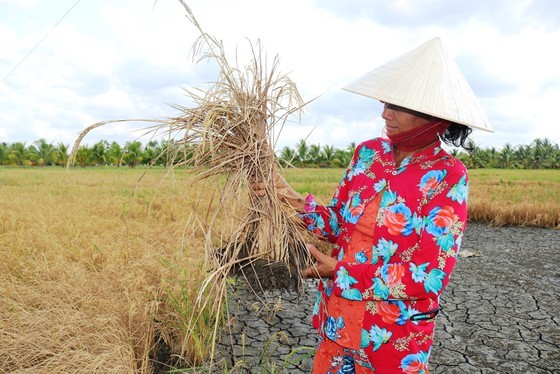
According to Mr. Le Thanh Tung, Deputy Director of the Department of Crop Production under the MARD, Southern farmers grew rice on an area of more than 1.6 million hectares in the winter-spring rice crop this year, down 68,500 hectares. The rice yield is estimated at 69.35 quintals per hectare, up 2.05 quintals per hectare, and rice production is estimated at 11.2 million tons, down 129,000 tons compared to last winter-spring rice crop.
Of which, provinces in the Mekong Delta grew rice on an area of 1.54 million hectares, down 63,000 hectares. Rice productivity is estimated at 69.79 quintals per hectare, up 2.01 quintals per hectare, and rice production is estimated at 10.7 million tons, down 118,000 tons. Generally, the cultivation of the winter-spring rice crop this year in the Mekong Delta was carried out 20-30 days earlier than the previous winter-spring rice crop. Favorable weather helped rice plants to grow and develop healthily and give high productivity and high quality of rice. Despite early saltwater intrusion, the winter-spring rice crop in the Mekong Delta was a bumper crop.
Mr. Nguyen Thanh Dung, Vice Chairman of the People’s Committee of Can Tho City, said that farmers in Can Tho City grew 77,000 hectares of rice and up to now, they have already finished harvesting. The productivity of rice was fairly high, reaching an average of 72 quintals per hectare and the average selling price was around VND5,300 per kilogram upwards. Therefore, farmers earn a profit of about 40 percent after excluding costs.
However, due to severe saltwater intrusion, 16,500 hectares of winter rice grown on shrimp-farming land in Ca Mau Province were affected, of which, nearly 14,000 hectares of rice were completely lost. As for the winter-spring rice crop, 33,800 hectares of rice were affected because of saltwater intrusion and drought at different levels, of which, more than 15,400 hectares of rice in Tra Vinh, Long An, Kien Giang, and Soc Trang provinces were lost all.
Most of the damaged areas were because of late sowing. Mr. Nguyen Van Chang, a farmer in Tan Son Commune in Tra Cu District in Tra Vinh Province, said that farmers did not think that drought and saltwater intrusion was more intense this year. As a result, more than 1 hectare of rice that his family sowed in January this year lacked water and was affected by saltwater intrusion.
Of which, provinces in the Mekong Delta grew rice on an area of 1.54 million hectares, down 63,000 hectares. Rice productivity is estimated at 69.79 quintals per hectare, up 2.01 quintals per hectare, and rice production is estimated at 10.7 million tons, down 118,000 tons. Generally, the cultivation of the winter-spring rice crop this year in the Mekong Delta was carried out 20-30 days earlier than the previous winter-spring rice crop. Favorable weather helped rice plants to grow and develop healthily and give high productivity and high quality of rice. Despite early saltwater intrusion, the winter-spring rice crop in the Mekong Delta was a bumper crop.
Mr. Nguyen Thanh Dung, Vice Chairman of the People’s Committee of Can Tho City, said that farmers in Can Tho City grew 77,000 hectares of rice and up to now, they have already finished harvesting. The productivity of rice was fairly high, reaching an average of 72 quintals per hectare and the average selling price was around VND5,300 per kilogram upwards. Therefore, farmers earn a profit of about 40 percent after excluding costs.
However, due to severe saltwater intrusion, 16,500 hectares of winter rice grown on shrimp-farming land in Ca Mau Province were affected, of which, nearly 14,000 hectares of rice were completely lost. As for the winter-spring rice crop, 33,800 hectares of rice were affected because of saltwater intrusion and drought at different levels, of which, more than 15,400 hectares of rice in Tra Vinh, Long An, Kien Giang, and Soc Trang provinces were lost all.
Most of the damaged areas were because of late sowing. Mr. Nguyen Van Chang, a farmer in Tan Son Commune in Tra Cu District in Tra Vinh Province, said that farmers did not think that drought and saltwater intrusion was more intense this year. As a result, more than 1 hectare of rice that his family sowed in January this year lacked water and was affected by saltwater intrusion.
 Saltwater intrusion damages paddy fields in Tra Vinh Province. (Photo: SGGP)
Saltwater intrusion damages paddy fields in Tra Vinh Province. (Photo: SGGP)
As for the summer-autumn rice crop, according to the MARD, Southern provinces will sow 1.6 million hectares. Of which, provinces in the Mekong Delta will sow 1.5 million hectares. It is necessary to focus on arranging the cultivation schedule of the summer-autumn rice crop, taking into account the autumn-winter and winter rice crops. Farmers will grow rice in the alluvial areas of Tien and Hau rivers, the Plain of Reeds, and a part of Long Xuyen Quadrangle in March and April; in rice-growing areas in Vinh Long, Tien Giang, Hau Giang, Soc Trang, and Tra Vinh provinces in May; in coastal areas in Long An, Tien Giang, Ben Tre, Tra Vinh, and Ca Mau provinces in June.
Provinces in the Mekong Delta said that the fact that the production of the summer-autumn rice crop is adjusted to accord with the developments of drought and saltwater intrusion will ensure effectiveness. However, it raised concerns as the prices of paddy in the Mekong Delta provinces tend to decline by VND200-VND500 per kilogram after the country halted new rice export contracts, affecting people’s sentiment. Basically, rice production was high, so provinces proposed the MARD and relevant departments to have suitable solutions for the export of rice.
Deputy Minister Le Quoc Doanh said that farmers in freshwater areas in Dong Thap, An Giang provinces and Can Tho City should sow rice early. For coastal areas, farmers only sow rice when there is no longer saltwater intrusion. The agricultural sector put all effort to have successful summer-autumn and autumn-winter rice crops to serve rice exports and food security well.
Provinces in the Mekong Delta said that the fact that the production of the summer-autumn rice crop is adjusted to accord with the developments of drought and saltwater intrusion will ensure effectiveness. However, it raised concerns as the prices of paddy in the Mekong Delta provinces tend to decline by VND200-VND500 per kilogram after the country halted new rice export contracts, affecting people’s sentiment. Basically, rice production was high, so provinces proposed the MARD and relevant departments to have suitable solutions for the export of rice.
Deputy Minister Le Quoc Doanh said that farmers in freshwater areas in Dong Thap, An Giang provinces and Can Tho City should sow rice early. For coastal areas, farmers only sow rice when there is no longer saltwater intrusion. The agricultural sector put all effort to have successful summer-autumn and autumn-winter rice crops to serve rice exports and food security well.
























